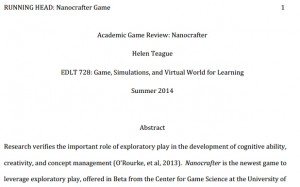Nanocrafter Game Review Abstract-Updated
RUNNING HEAD: Nanocrafter Game 1
Academic Game Review: Nanocrafter
Helen Teague
EDLT 728: Game, Simulations, and Virtual World for Learning
Dr. Mark Chen
Summer 2014
Abstract
Research verifies the important role of exploratory play in the development of cognitive ability, creativity, and concept management (O’Rourke, et al, 2013). Nanocrafter is the newest game to leverage exploratory play, offered in Beta from the Center for Game Science at the University of Washington (CGS). Announced at the Games for Change conference in April, 2014, Nanocrafter offers progressing levels of skill building for players as they visualize and build nanoscale representations of synthetic protein bonds. Synthetic protein bonds do not exist naturally and must be combined by scientists through synthetic biology. Synthetic biology and DNA protein bonds can be the medical solution to real-world challenges, such as disease treatment and debilitating medical conditions.
Educators will notice how Nanocrafter leverages the cognitive precepts of Wiggins and McTighe’s Understanding by Design (UbD), Strategic Design, and socio-affective attributes such as peer-review and collaborative groups. High-school students will find an engaging portal to strengthen STEM core competencies.
Keywords: games, simulations, protein bonds, synthetic biology
References
Finnish Innovation Fund (2014). Helsinki Design Lab. Retrieved from: www.helsinkidesignlab.org
Minoff, A. (2014). Can we game our way to better health? Science Friday podcast, April 24, 2014. Retrieved from http://www.sciencefriday.com/segment/04/25/2014/can-we-game-our-way-to-better-health.ht
O’Rourke, R., Butler, E., Liu, Y., Ballweber, C. and Popovi´c, Z. (2013). The Effects of Age on Player Behavior in Educational Games. Foundations of Digital Games. Center for Game Science Department of Computer Science & Engineering, University of Washington.
Retrieved from http://homes.cs.washington.edu/~eorourke/papers/age_behavior_fdg.pdf
The Center for Game Science at the University of Washington. Retrieved from http://centerforgamescience.org/
Wiggins, G., McTighe, J. (2005). Understanding by Design. Pearson.




